7 Types of Squat Rack India. Compared Half Rack or Full Rack?
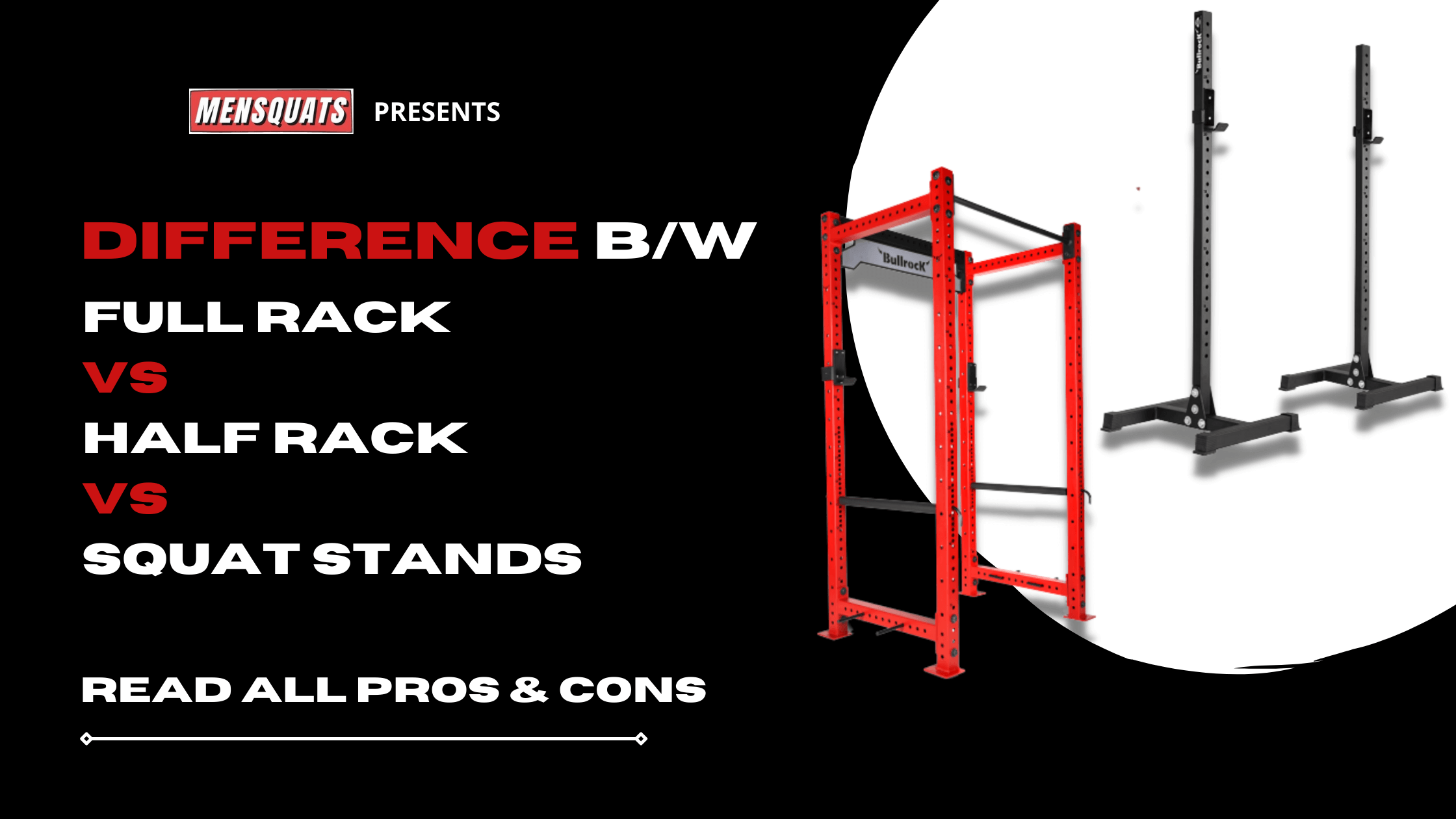
If you’re building your own home gym, your prime focus should be on getting the essentials first, and among squat stands or half rack or full rack which to purchase is arguably the most important decision to save yourself money and avoid buyer’s regret.
You’ll also want to buy equipment that guarantees safety & security (and racks do provide that without a doubt.😀)
But why do you need them? What are the different types of squat racks? How to use a squat rack India? Which to buy: Half rack or full rack and which other options are for you is to be discussed with its ✔️ pros and cons❌.
So based on my research, experience, and community input, the IDEAL rack should be versatile, durable, safe, and fit in the space it is to be used in. 💯
➡️ In this guide, we have explained every type of power rack, that combines excellent features, unlimited expandability, great quality, lots of customizability, and best of all, a great value. Because what I think is optimal for most people might not necessarily be true based on your own preferences.
So I always suggest getting other people’s opinions or at least kind of see what I’m getting myself into.
But that just wasn’t available here to see every squat rack before buying and I figured if I did a blog like this, it may help someone make up their mind if this is something right for them to purchase. 😊
Let’s get started.
Different Types of Squat Rack India You’ll Find.
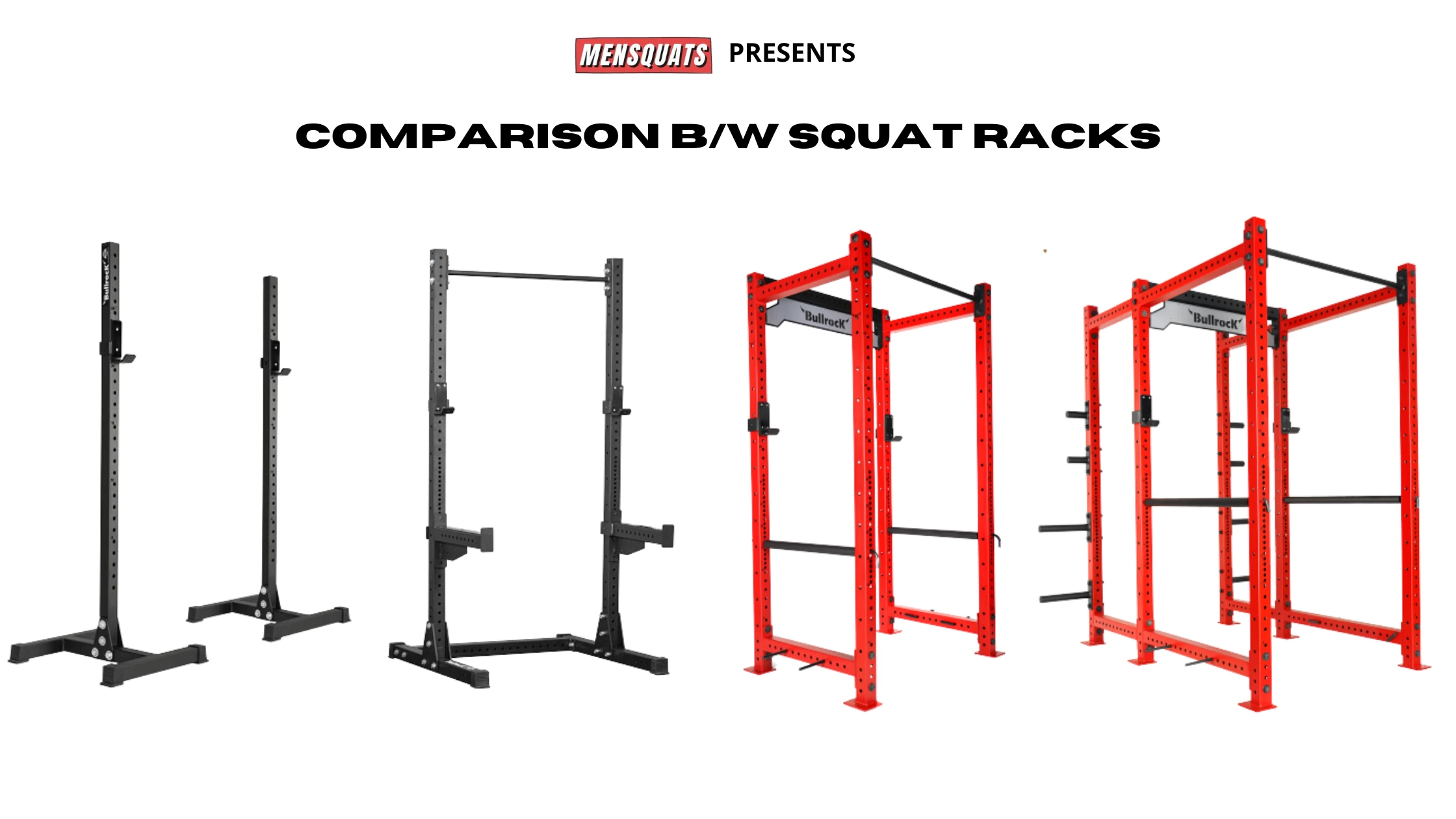
1. Squat Stand:
Squat stands are most commonly seen gym equipment, and ideal for, well, squatting. It consists of two upright metal bars on either side of you which can be adjusted in height, so you can set up the barbell position exactly where you want it to be.
How to use a squat stand? Position yourself under the bar, lift the bar off the stand, and move 1 step far from the 2 metal posts to execute a squat.
Finish and rerack the bar on its J-cup handles.
1️⃣ Space:
The biggest selling point for squat stands is that they have a small footprint. No matter how much or how little room you have at a home for a gym, a squat stand might be a good fit. 😀
2️⃣ Affordability:
These metal stands allow you to do all the main movements of squatting, benching, overhead press.
You could also probably get pretty creative and find some more ways to do other things as well.
But because they’re so minimal and usually don’t have a lot of pieces or a lot of steel added in their build for that matter, which full rack has, it makes squat stands usually also very affordable.
3️⃣ Design:
The nice thing about them is the design aspect. They’re made to not be bolted to the ground. So you don’t have to worry about plate storage. You don’t have to worry about building a platform to bolt it down to, or drilling holes in your concrete floors.
They fit almost anywhere in terms of the vertical footprint as well.
You can get very short with squat stands.
In fact, they don’t even have to have pull-up bars in some instances, which leads me to my first con. (If you consider this as a con)
❌ My Top Concerns with Squat Stands:
Less Attachments:
In some cases, they don’t have pull-up bars and they’re not meant for a lot of attachments. So if you’re looking at them getting into a home gym and you want to get a lot of versatile things like attachments for your gym pieces, this isn’t the rack for you.
Only Safety Options: Speaking of which, some of the pieces that it comes with or the only pieces it comes with in terms of safety options are spotter arms, which is also rare.
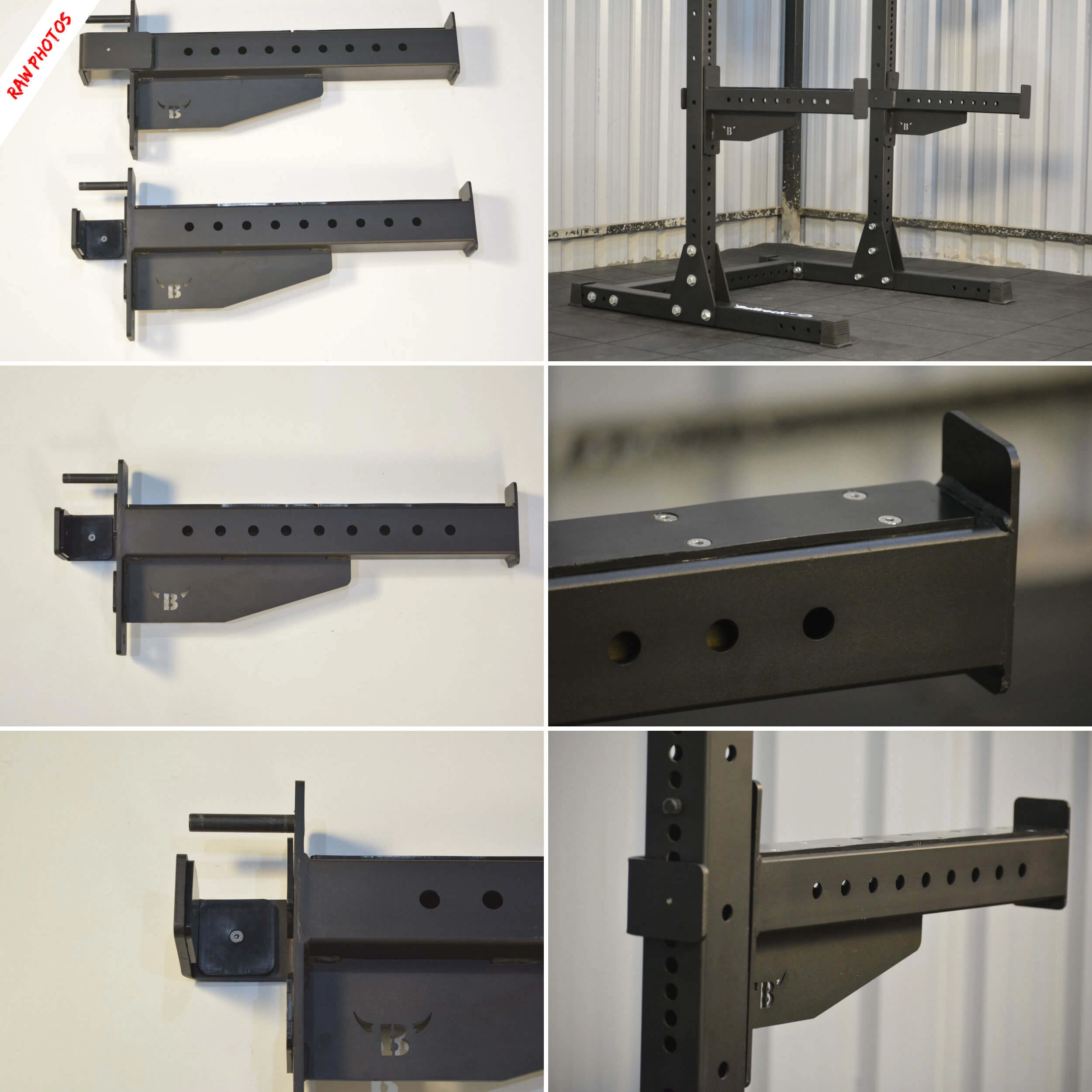
While they’ll get the job done but I’m not a big fan of these and lifting outside of a rack, because you can still have the chance of dropping the bar, and having those spotter arms/ or safety arms could not catch the weight so securely, like safety straps/ or pin pipes in full rack does. I don’t want you to risk it in that regard. 🤕
Also, they’re least preferable, as they may be unstable and you need a spotter always in case you are lifting extremely heavy.
Squat stands also typically have a lower weight capacity compared to some of the other full cages we’ll talk about further in this blog.
And many powerlifters that I know that have bought these, do eventually look to upgrade them with something that is more secure and has a higher weight capacity.
Pros
- Noticeably cheaper than power racks/ or half racks.
- Relatively small in design and perfect for small home gym spaces.
- Less in weight and can be moved easily from one place to another.😀
Cons
- Lacks four uprights that enclose the barbell.
- Most models don’t contain safety arms to catch the failed rep.
- Low attachments options are available.
- Have low weight capacity.
- Individual squat stands aren’t that stable and always require a spotter.
➡️ Who should get Squat Stands?
Overall, these are great for those who just want a no-frills solution at an affordable price. I don’t think it’s really good for those who want to get into the accessory game or upgrade the features and functionality down the road.
But for a beginner or intermediate lifter setting up his/ her first home gym, squat stands could prove to be a practical, affordable piece of equipment to start with.😀
➡️ Which is the Best squat stand in India?
BullrocK Raptor Independent Squat Stand India (300kg Weight Capacity)

- Item Dimensions LxWxH: 66 x 53.3 x 182.9 Centimeters
- Item Weight: 44.5 Kilograms
- Made with: 2.5”×2.5″ 11-gauge CR steel Pipe (3mm thick) & 5mm thick reinforced triangle plates
- Attachments: J-cups only, with 5mm padding of UHMW (covering 3 sides)
- Holes & spacing: 2” spaced throughout with numbering on the uprights.
- Warranty: 5-year Structural Warranty
BullrocK Raptor Squat Stand 486 Multipurpose Rack with Pull-Up Bar

- Weight capacity: 300kg Static Load & 180kg Dynamic Load of weights.
- Item Weight: 55.8 Kilograms
- Material: 2.5”x 2.5” 11-gauge (3mm) CR Steel | UHMW Plastic
- Dimensions: Length – 47”, Width – 47”, Height – 86”
- Footprint: 49″ x 47″
- Finish (Coating): 7-Tank Powder Coated
2. Half Rack
As the name suggests, half rack is half of the full rack and contains only two upright bars compared to four.
1️⃣ Space:
The basic pros with a half squat rack is it still has a small footprint, so not much more than your traditional squat stand, but you get the added benefit of almost always having plate storage attached to that.
So now you have a place to place all your weight plates neatly.
You don’t need to get a separate weight tree or lean them against the side of a wall like you would with a squat stand.
2️⃣ Safety option:
Half rack also opens up some spotting options, because with a half rack you typically have a full cage portion, albeit only typically about 20 to 24 inches worth of depth, nothing too deep, which is a con.
But with those spotting options, you can get pin safeties or strap safeties.
You can also, of course, use the spotter’s arms and lift outside the rack, which isn’t safe though, but you at least have similar options than just having to use the spotter arms.
3️⃣ Accessories:
Half rack also opens up a whole world of accessories, although somewhat limited to what you’ll see on some of the full racks options and that’s because the units themselves are heavier, they’re beefier, and they’re typically weighed down by the plate storage as mentioned.
So you can start adding some accessories in, like j-cups, and spotter arms.
The bottom line is, half racks are usually still more affordable than full-blown-out squat racks/ cages.😄
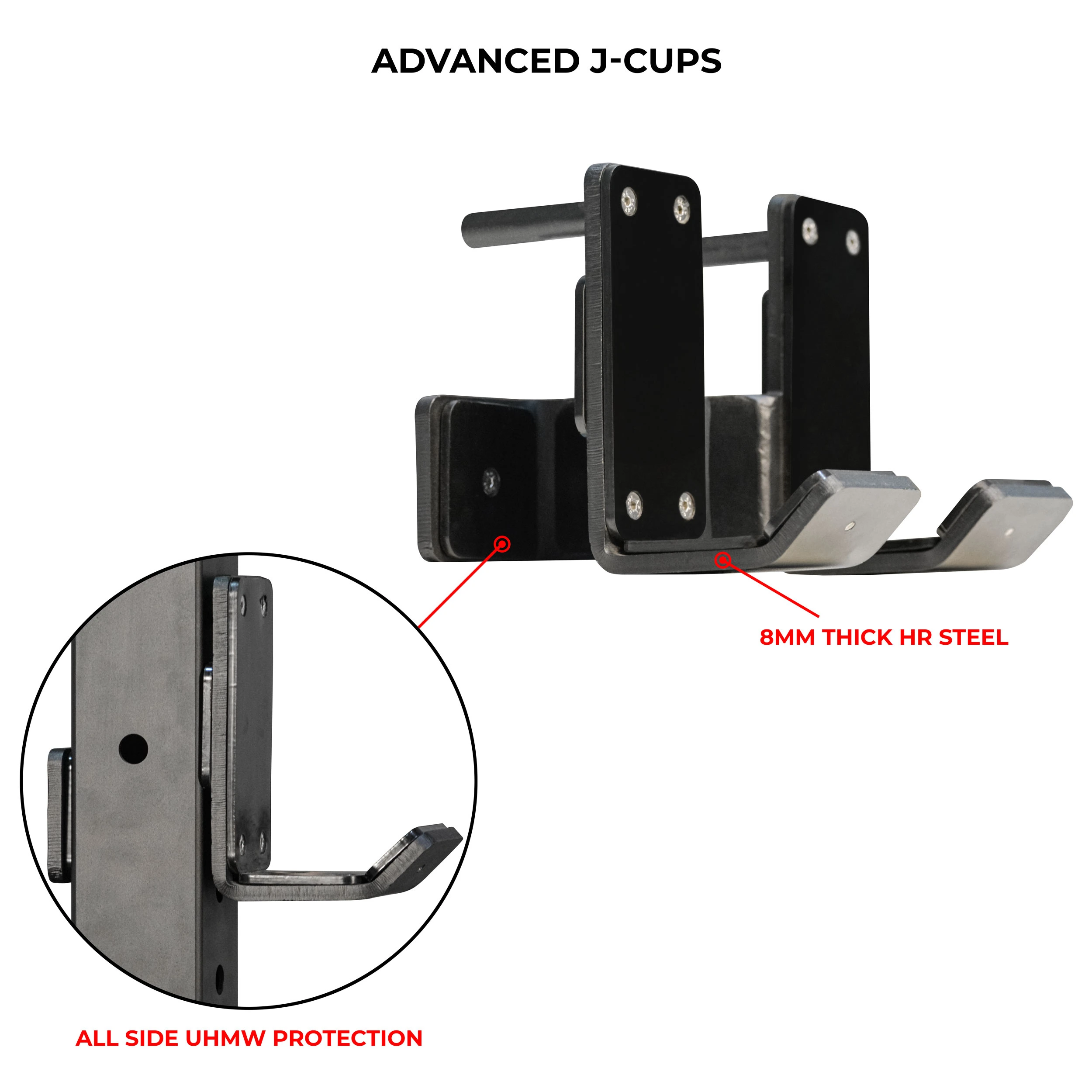
❌ My Top Concerns with Half Racks
Limited Depth:
Though the biggest con here is they’re not a full cage, for that reason you have limited depth to squat in half racks. None of the people like to actually lift in the cage itself, because the depth here is short, and it’s also going to impact where you can use the plate storage.😵 This kind of renders one useless, so it’s kind of like this or that.
Safety Concerns:
Thus many people still end up lifting outside of the actual half rack. In a full rack, you can’t step out of the protected area.
But in a half rack, you can step too far where even safety arms can’t catch the weight.
Though you have the freedom to have more add-on options with half rack than you could in a squat stand, it actually drives up to the price where you might want to consider a full rack because the prices will be pretty similar at that point. 😄
Lifting Position: Another downside for half rack India is the lifting orientation for squats. The way that you have to squat out of a half rack almost always is facing in or towards the back of the rack itself, which is almost always against a wall. So you’re always looking at a wall or a mirror in most cases.
If you compete in powerlifting shows, this is not good because it can throw you off when you go to the competition and have to look out and you’re seeing the judges or the crowd. Not a lot of people like to do that. ➡️ Personally speaking, when I squat, I like to try to emulate a more real competition situation.
Finally, last but not least, they’re (mentioning half rack) usually the same height as a full cage.
Again, you’re limited with some options here, and it’s one of the options because of which I didn’t actually end up liking the half squat rack, because it wouldn’t fit the vertical space as a 30-inch depth rack would. 🙉
Also, half racks are made of thinner steel and have a lighter weight limit than a full rack to make it more affordable, but still it more of is provides similar functions, footprint, and usability to squat stands.
Pros
- Takes up less footprint in your home gym.
- Less expensive to full rack options.
- You get more flexibility with doing barbell exercises.
- Comes with a plate storage attachment.
- You get some safety options, like spotter’s arms.
Cons
- Made of thinner steel compared to a full rack option.
- Have a lighter weight limit, 250 kgs or similar. (sufficient for many)
- Limited depth to squat.
- You can easily step out, and lift outside the protected region of the rack.
➡️ Who should buy a half-rack?
Overall, half-racks offer a nice medium between a squat stand and a full rack, and they’re available usually at a lower cost and with a smaller footprint.
However, the big downside is you can’t really lift inside of it if you plan on using all the plate storage, and it’s still not as safe as secure as a full cage/ full rack.
If you’re a fan of lifting in this style, facing the mirror, go get a half rack.
You get more safety options here than you get in a squat stand because we don’t know what would happen when we are moving 100s of kgs on our back. Racks are more of insurance for our lifting career, which we shouldn’t miss paying EMIs of.
➡️ Which is the best half rack for home gym in India?
Bullrock India Eco 2.0 Multipurpose rack With Spotter Arms

- Item Dimensions: 72″ Tall Squat stand with a 49″x47″ footprint
- Item Weight: 45 Kilograms
- Dynamic Load capacity: 250 kgs
- Made with: 60mm x 60mm 11-gauge steel for Uprights & for the base construction.
- J cups: 8mm thick steel with 5mm thick UHMW plastic liner that protects bar’s Knurl.
- Warranty: 3-year Structural Warranty
Everise Fitness X-Series Half Rack India (3 * 3 Heavy Frame)

- Deep J-hooks: 2. 75 inch with 19. 5-inch long spotter arms with mechanically fixed rubber pads to protect barbell knurling Frame width is compatible with barbells that have a 46 inch (collar to collar) grip width.
- Made of: Heavy duty 2×2 inch square steel tubing with 0.5-inch holes
- Weight capacity: 500 Kgs
- The Product has to be assembled. Free Installation assistance.
3. 4-Post Full Rack
If you’re a disciplined lifter, then you might want to consider having only a full rack/ power rack/ or power cage, many names people call it. To remove confusion of names, consider ‘power cage’ and ‘power rack’ words interchangeable.
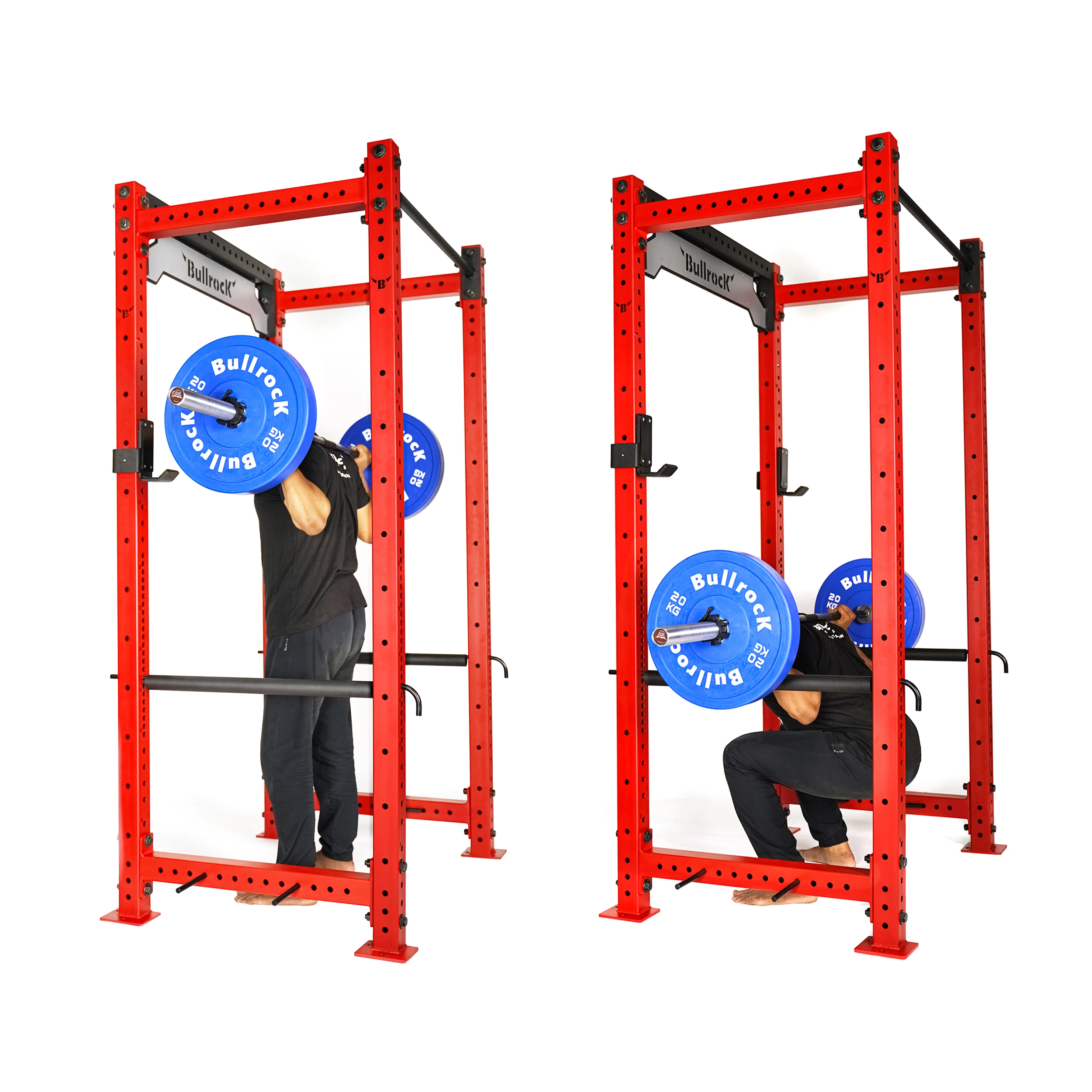
✔️ Powerlifters used to call the power rack a “cage” because here a lifter is allowed to lift a barbell in a metal framed cage like structure without the need of a spotter.
A power rack comes with four metal posts connected by horizontal framing and hooks and catchers fixed to the vertical rods, to hold the barbell.
1️⃣ Varying Depths:
The biggest pros here with 4 Post Full Rack is, varying depths are available here. The reason why this is important or beneficial for many people is because if you’re really concerned with your footprint, you can get varying depths to make sure that you’re getting as small a footprint as possible.
Maybe you like a 24-inch deep rack, or you want a 30-inch depth or a full-blown 43-inch depth rack. It’s possible with a full rack/ or power rack. You also get added stability as you go with those deeper racks, you have a lot of options in that regard. 💝
2️⃣ Many accessories available:
Another big PRO with a full rack is that you have many accessories available to you. Because of the footprint of the rack and the versatility of it, you can really start adding in a whole bunch of different things, including safety options like pins and pipes to which the actual half-rack can’t really have, like using straps in a 24-inch depth.
But as you start to get to some of those deeper racks, you can also use flip-down safety, all of which work a lot better in terms of failing because you’re covered literally from front to back.
Here, you don’t need anyone to spot you, and you can be confident that the rack isn’t going to give in anytime soon.
It’s not like a spotter arm, where you could potentially miss it when you fail a lift. 🤕
3️⃣ Versatility:
Speaking of versatility, you can do a lot outside of the main lifts of squatting and benching with a full rack. You can do an overhead press in the full rack, depending on how tall you are. You can also use some of the other accessories to add in to do a bunch of other movements.
Talking broadly, you really can do a lot more with this than you can with some of the other equipment.
4️⃣ Customizations:
It has the most options also for finishes, so if you really want to customize the look of your full rack, typically a full-on cage will give you those things you can add things like arches in the back.
Obviously, colors are more open here, to these racks as they tend to be higher ticket items. You have a lot more options in that regard as well.
❌ My Concerns with Full rack
Expensive:
The cons of which is as you add on all these options, it’s awfully gonna get really expensive. For many of these racks, especially 4 post ones, depending on the depth you’re going to need to either bolt these down or use plate storage.
The problem with using plate storage in this instance is it’s going to have to go usually on the front or rear of the rack which is going to interfere with the usability, especially depending on if you’re not getting a very deep rack.
🏋Now, of course, you can get pretty creative and make it work, but it’s just something to take into consideration otherwise these can actually end up taking up a larger footprint, especially as you start to add on some of these things that talk about different depths.
Height of the rack:
Also, you might have some height issues because a lot of these racks are standard at 90 inches. ✔️However, it’s true there are some short options available but not always, so you might see a rack you really like with a lot of the finishes and versatility, but it might not fit your space.
Assembly:
The last point, it isn’t really a con, but when this unit arrives to you. Its assembly takes time because it’s made of heavier steel which has 10-20 or more included components that are to be set, or tightened to frame a unit that you see.
Though every company provide active installation service at your home, or you can do it on your own following a booklet.
Pros
- More safety, more adjustment possibilities, and more versatility comes with a full rack.
- Very safe to lift and fail a lift inside the full rack cage.
- Made of thicker steel construction and very high in quality.
- Have higher DYNAMIC load capacity. ✔️
- You don’t need any spotter, or your friend to watch you.
Cons
- Requires a lot of space to install.
- Your remaining training space can be restricted.
- No sufficient clearance because of its height, which can damage your ceiling.
➡️ Bench pressing inside the full rack?
✔️You can easily use a flat or adjustable FID bench in both half rack or full rack to do various barbell benching movements. In fact, benching inside the rack is the safest thing to do. In case you miss a lift, the rack attachments, like spotter’s arms or safety straps, are there to hold the bar so you can easily move away.
There are no benches with a built-in rack, i.e. those that can only be used for bench pressing. Any built-in rack on such a bench would simply get in the way when moved into a full rack or half rack.
➡️ Width of the half rack, full rack, and squat rack?
Almost any home gym squat rack machine, half rack or full rack has Olympic width, or about 48” on the outside cages. Because they are made fit for a 7” Olympic bar which is about 52” between the shoulders.
✔️ This allows you to rest the shaft of the bar on the hooks/ or J-cups while till the time you can easily load weight plates on the sleeves.
➡️ Who should buy 4 post racks?
Overall, to be honest, for most people a four-post rack makes the most sense. You get the safety and comfort of lifting inside a cage, but can still minimize the footprint, and varying depths are available to really make it yours.
The downside here is that outside of a flat foot rack, you’ll still have to look into options to secure it. So it doesn’t tip over.
➡️ Which is the best full rack for home gym in India?
Gorilla Power Rack India 2.0 N | 30″ Depth | 4-Post

- Material: 3″ x3″ 11-gauge (3mm) CR Steel Tube | UHMW Plastic
- Dimensions: Length – 36”, Width – 47”, Height – 90”
- Footprint (incl. base feet): 38.8″ x 51.6″
- Max Load Capacity: 1000lbs/454kg
- Finish (Coating): 7-Tank Powder Coated
- Product Weight: 131kg
DOMYOS Weight Training Gym Squat Rack India 900
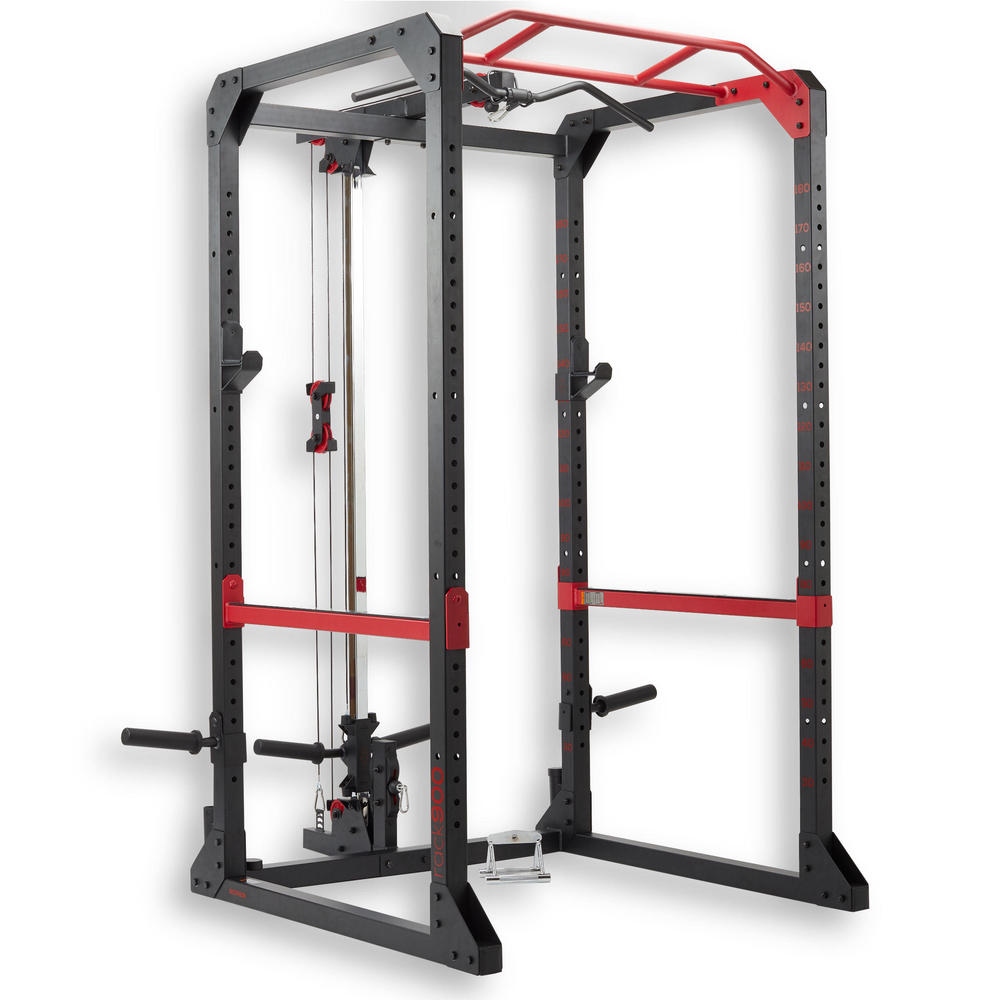
- Maximum loads supported: Chin-up bar: 150 kg (130 kg body weight + 20 kg added weight) Pully: 100 kg, Bar supports: 200 kg
- Warranty: 2 Years
- DIMENSIONS: W = 121 cm, L = 166 cm, H = 216 cm, Weight = 101 kg
4. Full rack with 6 posts
For instance, if you want to add a belt squat, a lat pulldown, a reverse hyper attachment for a rack you can do all that and not impact the lifting area.
✔️ The pros here are going to be a lot of the same ones like the 4 post rack. But you have the added benefit of integrating some drop-in attachments without impacting the usability.
1️⃣ Speaking more of the lifting area because you have a third row, so to say in this case you can put the plate storage there and not take it away from the main area itself either.
These six-post racks usually offer the most customizations from most companies because these are the flagship offerings and because of the six posts and the footprint that it takes up, you usually don’t ever have to bolt these down due to the footprint.
Now the cons, again same cons as the four-post.
2️⃣ The footprint here is really hard to minimize with even shorter depth racks you’re still going to have 6 overall posts, three rows of post it’s going to take up a good amount of footprint, and because again they’re typically the flagship offerings for most companies
The price is also usually the highest of all options. So if you’re looking to cut this down because many of these don’t come in short versions, you usually might have to pay a premium in order to do that.
➡️ Who should buy 6 post racks?
Overall, I think 6 post racks are nice and if you have the space and the budget, these are great racks. But again, for most people, 4 posts rack makes the most sense and offers a lot of the same benefits and not that many trade-offs considering how much you might save going that route.
Gorilla Power Rack 2.0 N | 41″ Depth | 6-Post

- Material: 3″ x3″ 11-gauge (3mm) CR Steel Tube | UHMW Plastic
- Dimensions: L– 74”, W– 47”, H– 90″
- Footprint (incl. base feet): 76.7″ x 51.6″
- Max Load Capacity: 1000lbs/454kg
- Finish (Coating): 7-Tank Powder Coated
- Product Weight: 197kg
- Warranty: 10-year Structural Warranty
5. Combo Rack
We covered all the main different types of squat rack India, but there are some of the things out there which we can’t miss out on, for example, a combo rack. Combo rack, means you can use it for 2 purposes, one for benching and squatting.
The pro here is that it takes up a pretty small footprint, it’s great for multiple users, it’s adjustable in height. No matter who’s using it you can quickly adjust it using the levers and pretty much get a fully loaded bar at different heights without having to unload the bar and it’s not really impacted by low ceilings due to the overall footprint it takes in.
➡️ There are also some other nice benefits, like having built-in rollers, and typically you’ll find nice competition-style benches on them. The cons over though these aren’t meant to really fail in, they’re meant to be used at competitions where you’re having spotters by your side.
Even though they have face savers on there, you shouldn’t be using those or relying on those to fail as they’re not really meant to hold several hundred kilos of weight. 🤕
Now with this – because they’re pretty much no-frills and meant for competition purposes only you’re not going to find many accessories available, in fact, you won’t find any accessories available with Combo Rack.
Therefore, you get very limited usability here, and not to mention the fact that they’re just meant for benching and squatting, they’re also extremely expensive for what they are.
➡️ Who should buy a Combo rack?
These are really great for people who compete and want to kind of emulate the conditions or just want something simple, a squat and bench in, and don’t mind paying a high price for it. But for home use, I don’t think it is very practical.
6. Folding Racks
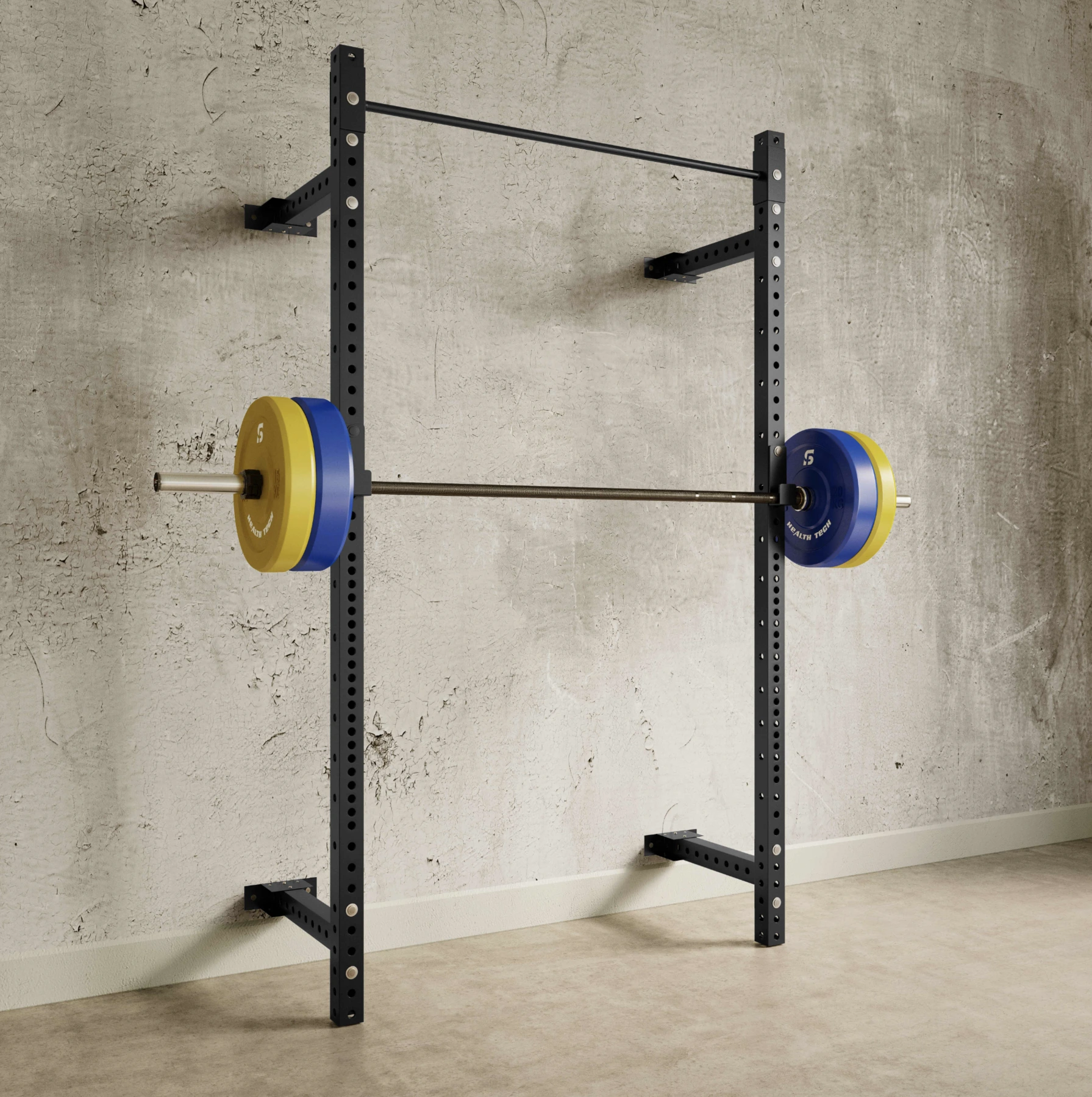
Even though I could probably lump these into one of the other categories of figuring out different types of squat rack, I think folding racks stand on their own.
The pros here are they’re similar to usability, as a squat stand is in most circumstances, but they have some added benefit because they’re usually attached to a wall or braced against it.
A folding rack option is more rigid in that sense and they really might be one of the best in terms of a footprint.
As these can be put away, whether that’s folding up or broken down, ever you want to mention it’s easy to break these down so they take up little to no footprint when not in use.
❌ The cons here are, compared to squat stand, folding racks really provide a lot of the same usability, and people that own these they don’t ever actually fold them up, outside of the first few times. They just leave them in their own spot because they won’t take up much room anyways.
Accessories available:
While accessories sometimes available are pretty limited and the units are usually a little bit more pricey than a squat stand. They still don’t have the safety of being in a cage, because you have to lift outside of it.
So you still have to use spotter arms and a lot of times actually having to set these things up can be kind of annoying, which I think is a reason why a lot of people don’t put them away as well.
➡️ Who should buy folding racks?
Overall, if you really want folding racks, then I suppose it’s a good fit, especially if you plan on putting it away, but I think a squat stand makes more sense for most people.
7. Squat Rack
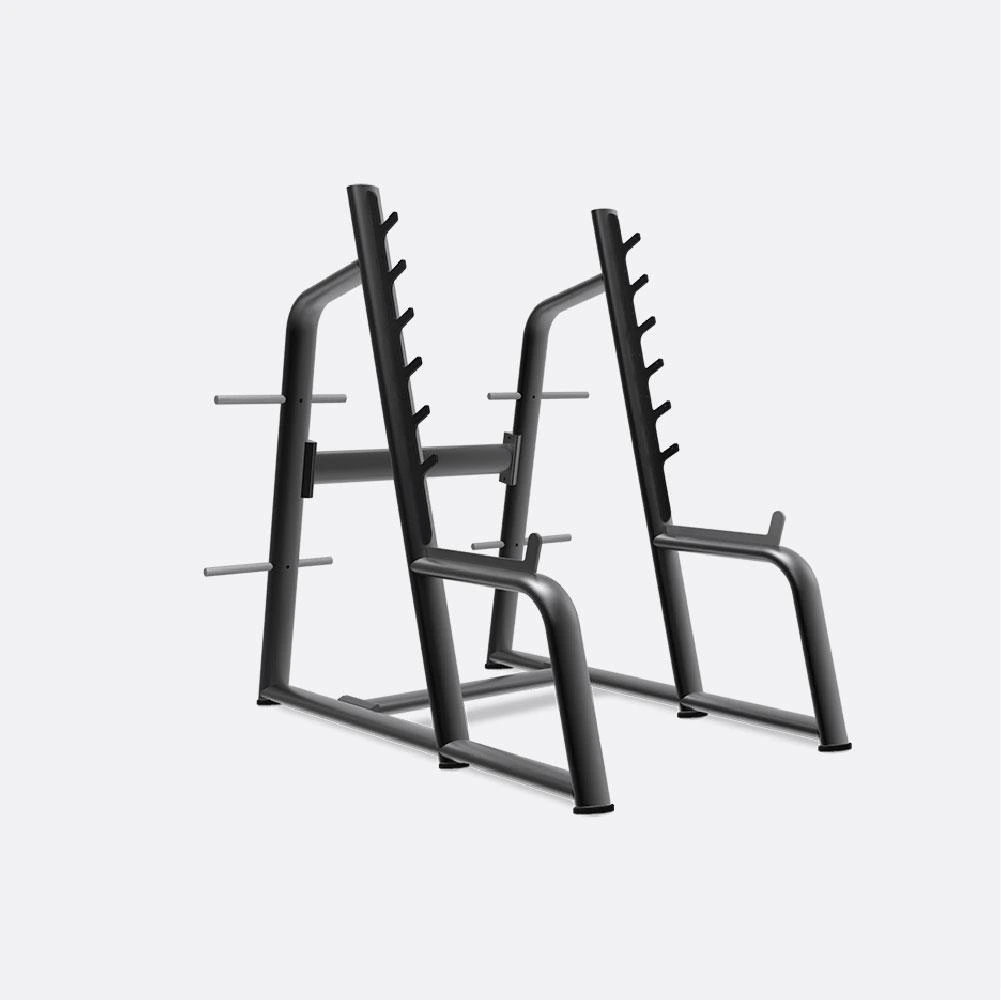
The originally squat rack can mean just about anything. All racks are designed to do squats. But what squat racks machine have in common with the half rack?
Where half rack has adjustable spotter arms wherein squat rack machine has unmovable spotter arms, which means a lack of user-friendliness, which is the biggest drawback here. ❌
Still, you commonly see them in most of Indian gyms, as a replacement for the half rack, full rack, or just any rack.
You get multiple but static gun rack style bar hooks, instead of a J-cups attachment to hold the barbell and adjust for the lifter’s height.
This design can be a pain for lifters because the hooks in the squat rack are set several inches apart from one another, and at an angle. This could lead you to either pick the barbell from an inch below or above to your normal racking position.
Also, the fixed spotter arms are placed at a height, where it might suit tall lifters but for short lifters, they can’t even squat halfway when the bar touches the spotter’s arms.
This makes it unsuitable for lifters of all heights, who know the benefits to squat at a depth.
Price:
They aren’t cheaper than any full racks, but still you can spot them in gyms. Because this unit can’t be moved, can’t be adjusted thus bringing less maintenance or worry to gym owners.
They aren’t a good fit for squats, but overhead presses can be done on them.
FAQs of Squat Rack India
Q1: Are smith machines power racks?
Smith machine vs squat rack. Smith machines, is a rack-like device but aren’t a power pack. It doesn’t belong to the same class. The Smith machine enables a barbell to travel with weights to move up and down.
The barbell may be locked into place and can be adjusted to a variety of positions and ranges of motion, but is redistricted to move in the same vertical line. This puts undue stress on the back and knees, and you’ve to push against the machine’s support rather than into the bar.
Also, there is no safety or support added to smith machines. Therefore, squatting in a rack and in a smith machine is very different. We always advise using free weights inside racks.
Q2: What do you put under a rack?
You can place the rack frame on the top of the gym weight-friendly rubber mat to safeguard your floors and make the rack not slide over them, if you don’t choose to bolt it down.
Q3: Do you have to bolt down a half rack or full rack?
Many racks come with an option to bolt them down to the flooring, but it isn’t necessary if they have a bolt-down option, but if they do this only gives them added stability and support. In case you drop the heavy loaded barbell, due to a sudden strike of massive load dropped onto the rack, the rack won’t move or fall onto you.
Q4: Which to choose between half rack or full rack?
For most intents and purposes, you should always use a power cage/ full rack whether you are lifting in your privacy, or in commercial gyms. It fulfills your all-purpose and gives you that additional safety, the stability you ever need.
But if you have a lower budget and less space in your lifting area, then the case might be different. If not, full rack, then half rack with safety arms is almost as good. You can still feel safe in a half-rack, which you might not feel in a squat stand, especially if you are a beginner.
And once you get more confident, then you can experiment with the freedom that comes with independent squat stands.
Thats all for this blog, “7 Types of Squat Rack India: Which to Buy b/w Half Rack or Full Rack or Squat Stand?”.
✔️ I think I covered my bases with most of the racks that are available, just some feedback based on who I think they’re for and who I think they aren’t.
Let me know in the comment section below if I missed anything or you want any specific recommendations based on any of these. But in the meantime, as always, thanks for reading.
Also Read:
- A Champion’s Guide On How To Choose Best Barbell For Home Gym India
- A Buyer’s Guide to Choose b/w Different Types of Weight Plates?
- 3 Reasons Why You Shouldn’t Rely On Cheap Weight Plates Set Anymore.
If you have any particular questions you can send it to info@mensquats.com or Direct Message me on Instagram, _mensquats_
If you liked this piece, please share it with your friends.
Sharing is caring. ❤️
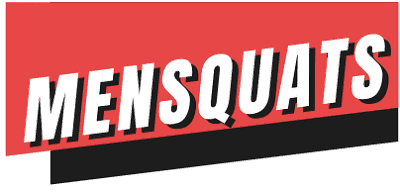
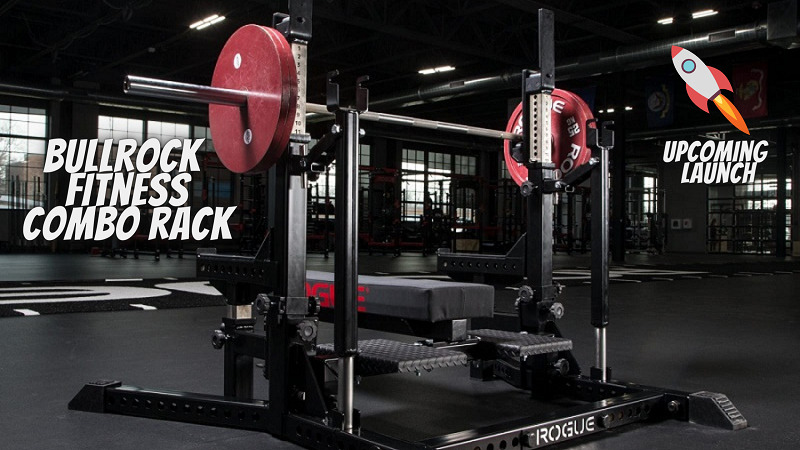
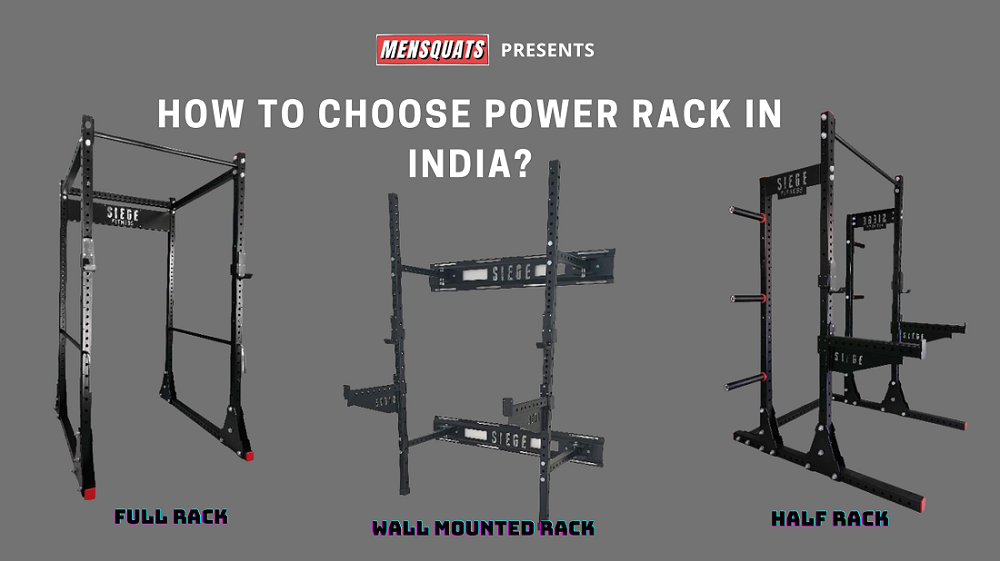
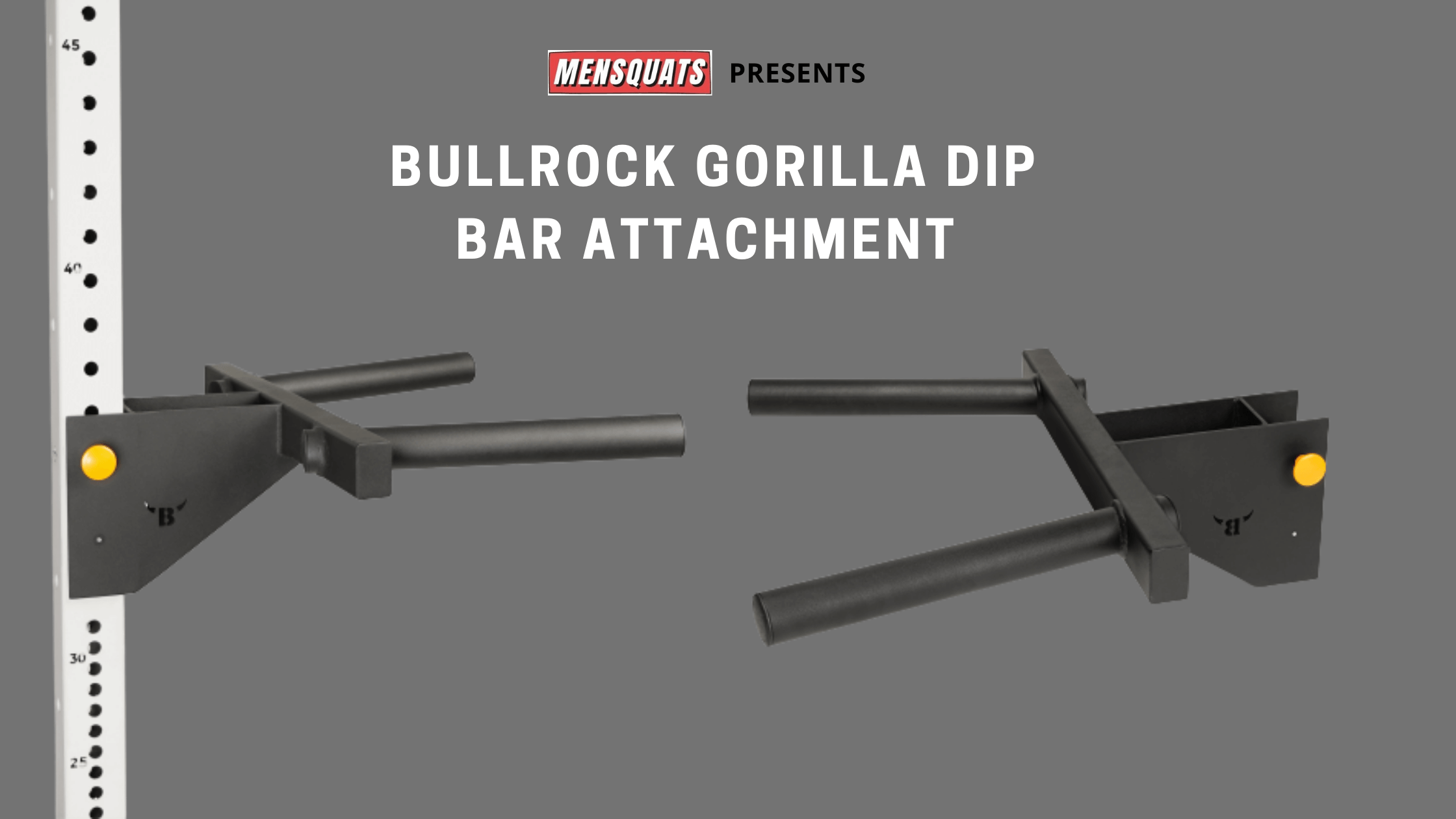

Superb article, after reading this now I m convinced that I should buy a Full rack (4 post). I really like the Domyos Rack 900 but they don’t have any additional attachments option and also it’s 2”x2” section so it’s also difficult to find additional attachments from other brands like USI etc.I love the Bullrock Gorilla rack but they don’t have this lag pull down attachment to get the most out of the rack.
Kindly suggest some other brands which are providing Bullrock like design and quality with lots of attachments option and in the similar budget.
Hello sunmeet, I think you’re the same guy who commented on my bullrock red turtle bar post. Again thanks for your kind words. I think you must go for bullrock racks, they have a range of options which clearly no one offers, there are endless possibilities of attachments you can add with them. If you don’t see an lat pull-down attachment now, it can be available to you or you can buy it separately from any company. Mind you: It’s designed first for being a squat rack not a functional trainer. And the sole purpose of having a rack is safety and the ability to do multiple exercises in 1 setting doesn’t compromise here. If you have more questions, kindly reply here or send me a DM on insta: _mensquats_
If you buy anything from our reference, please share it with the company. It spreads our authority in the domain. ThankYou.